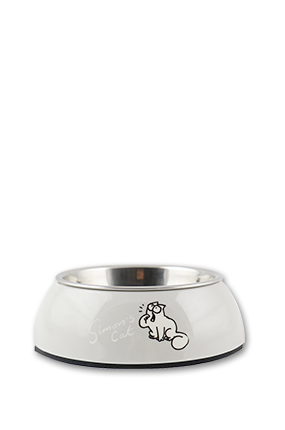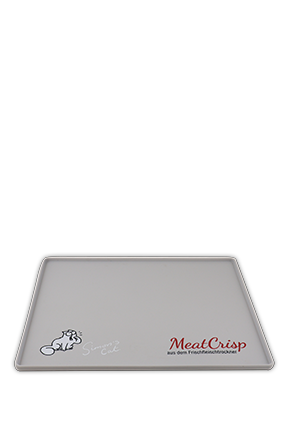My cat has stopped eating: What should I do?
My cat has stopped eating: causes and reasons
Cats are very picky about what they eat, and many cat owners are aware of this. But it is still very worrying when your beloved pet suddenly stops eating the cat food it is used to. There can be many reasons why a cat stops eating. Some of the reasons are harmless, but cats refusing food should not be taken lightly. This is because cats’ bodies, unlike dogs’, do not cope well with hunger, so serious health problems can quickly develop.
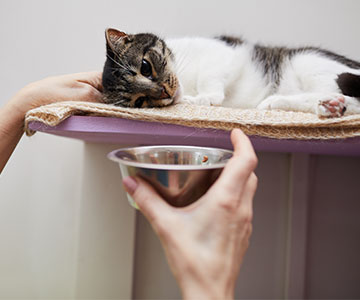 Cat stops eating, suddenly refusing its cat food
Cat stops eating, suddenly refusing its cat food
1. A change in cat food can lead to refusal to eat
Cats are true creatures of habit and usually do not like change. Unlike humans, they do not necessarily need variety in their diet. Quite the opposite: A change of food can cause your cat to stop eating. A change in the recipe of the cat’s usual food can also cause the cat to refuse it suddenly. If you still want to change your cat’s food or have to change for health reasons, you should follow the changing cat food procedure step by step.
2. My cat has stopped eating: New feeding place or feeding bowl?
Likewise, changes to the feeding place or bowl can cause the cat to feel uncomfortable eating and therefore to stop. Essentially, the place where your pet is fed should be a quiet and safe location, with no through traffic or stress. Cats also prefer shallow bowls or dishes that do not have an odour of their own. Some cats will even eat only off flat plates, as their tactile hairs do not then make contact with the edge.
3. Diseases can cause loss of appetite
Many diseases can cause a cat to lose its appetite and thus refuse to eat. Diseases of the organs can trigger nausea, for example, which causes the cat to lose its appetite and not eat. Dental diseases, such as tartar or gingivitis, can also cause severe pain when eating. Such pain is often identified by your cat tilting its head to one side while eating and chewing on one side.
4. Psychological factors as a cause of refusal to eat
Just as with human beings, psychological factors can play a role in cats. These literally hit our cats in the stomach, which can be another reason why they lose their appetite. The loss of a partner animal or a caregiver can lead to grief in cats. This can therefore also be a trigger for your cat not eating. Similarly, a new arrival in the family can cause stress and discomfort for your cat, which also translates into loss of appetite. Whether a new human or animal joins the family, cats need time and patience as they get used to the new situation. Especially if your pet is brought together with a dog, your cat may only eat a little food if any at first.
5. Unplanned snacks can lead to refusal of cat food
Other snacks that are given to your cat throughout the day, in addition to its cat food, should also not be underestimated. Outdoor cats can eat their fill elsewhere and will not then touch their cat food at home. They may be getting treats from the animal lovers next door or they may hunt prey themselves. A large number of treats between feeds can mean that your cat is not hungry and leaves its food. Cats also learn that it is not worth eating their food, as their owners will then offer them something tastier.
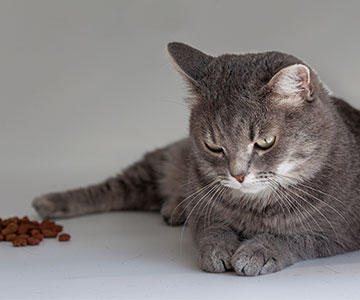 The reasons why a cat stops eating can vary considerably
The reasons why a cat stops eating can vary considerably
My cat stops eating its usual food
However, it is not uncommon for cat owners to find that their cat suddenly stops eating the cat food it is used to. This can happen even though nothing has changed in day-to-day life and health problems have been ruled out by a vet. In the course of a cat's life, it may well happen that its taste changes and it simply no longer fancies old familiar tastes. For example, if you have been feeding your cat food that has beef as a protein source for a long time and it now refuses to eat it, simply try a different type such as salmon or chicken.
Your cat sleeps a lot and eats only a little, if at all
In order to assess the state of your cat’s health, it is important to be able to identify clearly whether it is just eating very little or nothing at all. If your cat does not eat much food, you can observe its behaviour and try to find the cause of its refusal to eat. Harmless triggers can often be the problem, which either go away on their own (e.g. getting used to a new pet) or are easy to resolve (e.g. by going back to a previous feeding place or bowl).
- Weight loss
- Dull, ragged coat
- Fever
- Diarrhoea and vomiting
- Increased thirst and urine output
- Fatigue, weakness and apathy
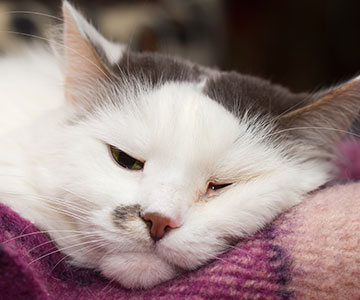 Help, your cat is not eating and sleeps a lot
Help, your cat is not eating and sleeps a lot
How dangerous is it if my cat does not eat?
Warning! Cats that have not taken any food, including treats, for more than 48 hours require urgent treatment. Cats are very sensitive to periods without food and, especially in overweight cats, they can quickly lead to serious health problems such as liver failure. In this case, consult a vet as soon as possible. If the problem occurs at a weekend or on a public holiday and your usual vet is not available, look for an alternative urgently and don’t leave it too long! Not only the refusal to eat and the resulting starvation can be life-threatening, but the underlying cause could also have serious health consequences and must therefore be investigated urgently.
Possible dangerous causes leading to loss of appetite
Some causes can lead to serious problems in the long run without treatment or if they are left completely undetected. The vet will help you find the cause. They can also prescribe the right treatment so that your cat recovers quickly and starts eating again.
- Intolerances or allergies that were previously unknown
- Toothache, inflammation or even tumours in the mouth
- Parasites
- Organic diseases
- Foreign bodies in the gastrointestinal tract
- Poisoning (e.g. from toxic plants or food)
What can I do to encourage my cat to eat?
In addition to observing the cat for other symptoms that may indicate illness (for example, diarrhoea, vomiting, tiredness or aggression), make sure your cat is not eating its fill elsewhere. This is only possible to a limited extent with outdoor cats, as their hunting behaviour is difficult to monitor. However, a nice chat with the neighbours can provide you with information about other possible sources of food for your cat and may be helpful.
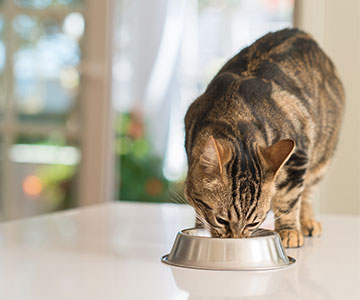 Some cats prefere deep bowls
Some cats prefere deep bowls


 Deutsch
Deutsch
 English
English
 Nederlands
Nederlands
 Français
Français

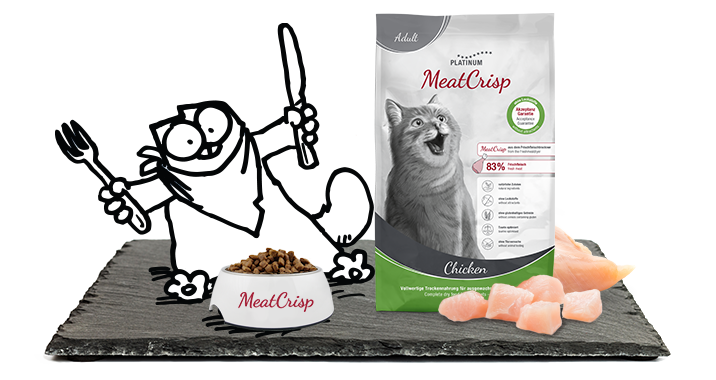
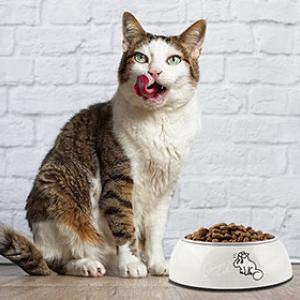
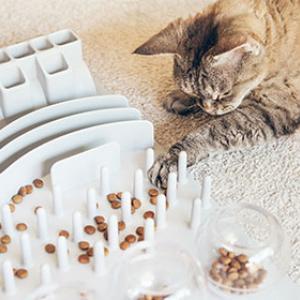
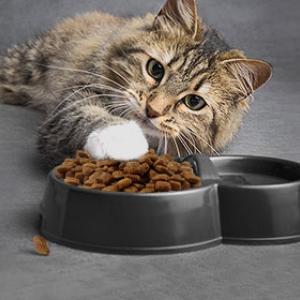
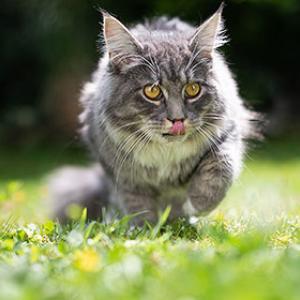
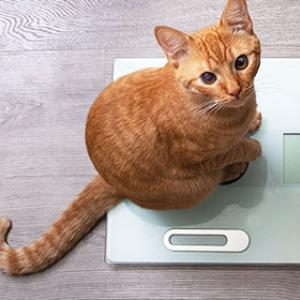
.png)
.png)
.png)
